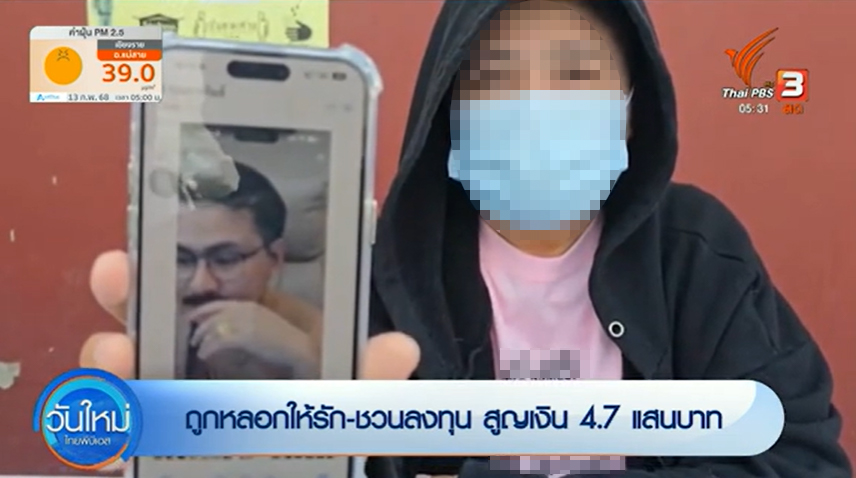Therefore, being aware of and understanding these techniques is the most effective way to protect yourself. Thai PBS Verify introduces you to the emotional manipulation strategies that scammers use and how to protect yourself from falling prey to such psychological traps.
Emotions: The Key Psychological Tools Scammers Use to Deceive Victims

We spoke with Assoc. Prof. Lt. Dr. Jomdet Trimek, Associate Dean of the College of Leadership and Social Innovation at Rangsit University, who shared insights into the psychology commonly employed by scammers. He explained that from the past to the present, scammers consistently emotional manipulation as their primary method of deceiving victims. The emotions they exploit can be categorized into four main types:
Love

Romance Scam or Love Scam is a fraudulent scheme where scammers build emotional relationships with victims to exploit them financially. These criminals often pretend to be loving partners or ideal companions, gradually gaining the victim’s trust. Over time, they manipulate the victim into transferring money or sharing sensitive information. This type of scam does not emphasize a short or rapid timeframe but instead relies on the victim’s emotions and trust. Once the scammer is confident in the victim’s emotional investment, they proceed with their deceitful plans.
Fear Tactics

Scammers often use fear as a trigger to panic their victims. For example, they may claim to be officials from government agencies, such as the police, and allege that the victim is involved in a money laundering case. They threaten that if immediate action is not taken, the victim might face legal consequences. In terms of fear, victims who are deceived often already have a predisposition to fear. They might harbor deep-seated guilt or minor misdeeds they have kept secret. When scammers exploit this fear, it leads the victim to feel anxious and believe the threats made by the scammers.
Sunk Cost Fallacy Scam
Regret often leads to greater damage. Once victims are deceived into paying money—whether out of fear or greed—and begin to regret the payment, scammers often exploit this feeling further. They comfort victims, claiming that if they want their money back, they must transfer additional funds “as a ‘withdrawal fee'”. Scammers use language that makes them appear as allies, manipulating feelings of inferiority or sowing doubt if victims remain suspicious.
This tactic convinces victims that they are receiving genuine help. Driven by the emotional pain of losing money and the desire to recover it, victims often comply and eventually become repeat victims.
Greed & Reward Promises
Even though the number of victims deceived by scams targeting greed may, manipulating feelings of inferiority or sowing doubt if victims remain suspicious., greed-based scams often result in the, manipulating feelings of inferiority or sowing doubt if victims remain suspicious. Most victims targeted by such scams tend to be wealthy individuals with an investment-oriented mindset. They often live by or believe in various investment practices. Currently, scammers still use traditional techniques to lure victims with offers that seem too good to be true, such as promises of high returns in a short time frame. This method tends to attract victims to invest and receive initial returns. However, once victims fall for these schemes and invest more out of greed they are ultimately defrauded and lose all their money, often receiving only a small amount back.
Guidelines for Self-Protection from Criminologists
Maintaining composure, avoiding emotional reactions, and refraining from making rushed decisions remain essential. Given the prolonged period during which Thai people have been exposed to call-center scams, it is believed that most citizens have developed some degree of immunity to such tactics. This includes practices such as not answering unfamiliar phone numbers, using screening technology, and conducting initial checks independently.
Although awareness is important, what is even more crucial is being mindful of one’s own emotions. Everyone experiences different feelings at various moments.
For example, Mr. A might have previously committed a minor offense, such as selling e-cigarettes. At a moment when scammers call and threaten him, heightening his fear, Mr. A becomes frightened of facing legal action and complies by transferring money to the scammers, who claim it is for inspection or asset seizure, ultimately losing his money. Similarly, Ms. B, who might be experiencing heartbreak, coincidentally becomes a target of scammers pretending to offer love. This emotional vulnerability might lead her to develop feelings or fall in love with the scammer. Eventually, she is deceived, perhaps being told that they will come to live with her or send valuable items. However, she is asked to pay taxes on these items, and having fallen in love, she might believe them, ultimately losing her possessions.
Therefore, in addition to being aware of cyber threats, the most crucial factor is maintaining composure and understanding your own emotions. No matter how much knowledge one possesses, without mindfulness and emotional awareness, it is still possible to fall prey to these scammers.





